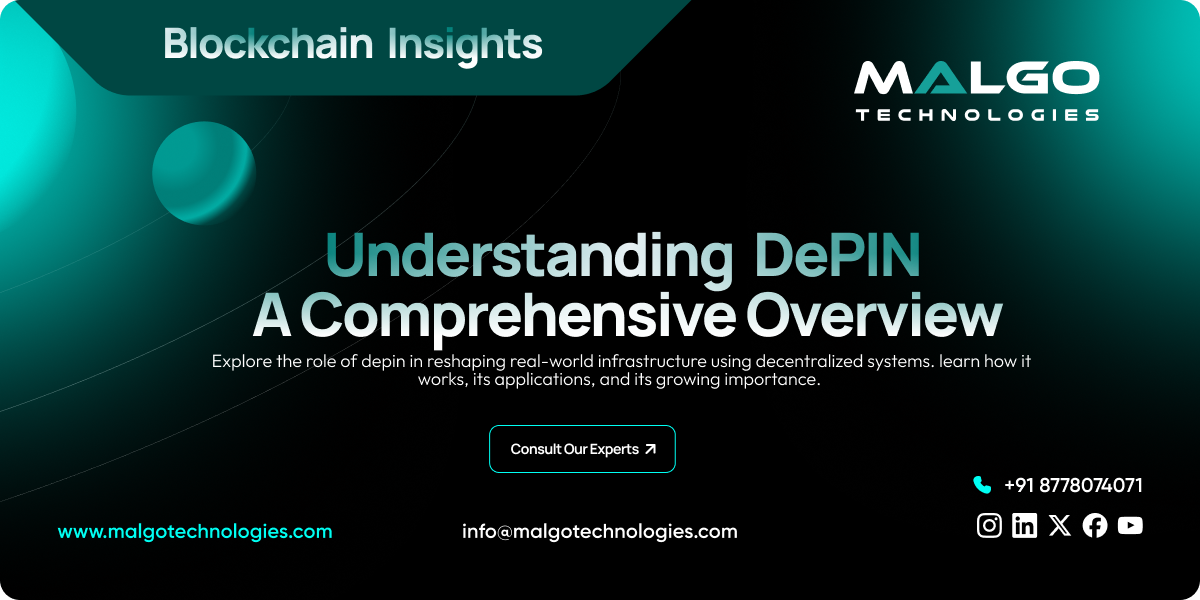Introduction
The Shift to Decentralized Systems
The digital age has exposed the limitations of centralized infrastructure, from telecom monopolies to data centers vulnerable to outages. Growing demands for privacy, transparency, and equitable access are driving a new paradigm: Decentralized Physical Infrastructure Networks (DePIN). By leveraging blockchain technology, DePIN enables communities to build and maintain real-world systems like internet networks, storage solutions, and energy grids without centralized control. This shift mirrors the impact of Decentralized Finance (DeFi) on banking, offering a participatory model for infrastructure. Malgo, a pioneer in decentralized exchange (DEX) and infrastructure development, empowers businesses to create scalable, secure DePIN solutions, integrating blockchain and hardware expertise.
DePIN: Decentralizing Infrastructure and Empowering the Next Wave of Innovators
DePIN democratizes infrastructure by allowing anyone with compatible hardware—such as a Wi-Fi router or storage drive—to contribute resources and earn tokenized rewards. This model reduces reliance on corporate giants, fosters resilience, and unlocks economic opportunities for individuals and small businesses. With the global blockchain market projected to grow significantly by 2030, DePIN is poised to revolutionize industries like telecommunications, logistics, and energy, making it a prime opportunity for innovators.
What is DePIN?
DePIN, or Decentralized Physical Infrastructure Networks, refers to blockchain-based systems that coordinate and incentivize the operation of physical infrastructure, such as wireless hotspots, data storage, or sensor networks, without a central authority. Participants deploy hardware devices, contribute resources like bandwidth or storage, and earn tokens through smart contract-driven rewards. Malgo’s decentralized solutions simplify DePIN development, offering secure blockchain frameworks, smart contract design, and hardware integration tailored to specific use cases.
What is DePIN in Crypto?
DePIN (Decentralized Physical Infrastructure Networks) refers to blockchain-based systems that coordinate and reward the operation of real-world infrastructure—like wireless networks, data storage, and sensors—without central control. Participants deploy physical hardware (e.g., routers, drives, or IoT devices), contribute resources, and earn crypto tokens through smart contracts.
Unlike traditional infrastructure run by corporations, DePIN is community-powered, transparent, and resilient. Projects like Helium (wireless), Filecoin (storage), and DIMO (vehicle data) showcase its real-world potential.
Traditional vs. DePIN
Traditional infrastructure, managed by corporations like ISPs or utility providers, is capital-intensive, prone to single points of failure, and often inaccessible in underserved regions. DePIN flips this model by:
Crowdsourcing Contributions: Anyone with a compatible device can participate, reducing costs.
Ensuring Transparency: Blockchain logs all actions, eliminating opaque pricing or control.
Enhancing Resilience: Distributed networks avoid centralized vulnerabilities.
For example, a traditional ISP might require massive infrastructure investments, while a DePIN wireless network grows organically as users add hotspots. Malgo’s expertise bridges this transition, enabling businesses to adopt decentralized models efficiently.
Core Components of DePIN
DePIN networks rely on a synergy of technical and economic elements to function effectively:
Hardware Nodes: Physical devices like routers, sensors, servers, or storage drives form the network’s foundation. For instance, a Helium hotspot provides IoT connectivity, while a Filecoin node stores data.
Blockchain Layer: A decentralized ledger (e.g., Ethereum, Solana) records contributions, validates data, and distributes rewards, ensuring trust among participants.
Tokenomics: Tokens incentivize participation, facilitate payments, and enable governance. Well-designed tokenomics align contributor efforts with network goals.
Smart Contracts: Self-executing agreements automate tasks like reward distribution, data verification, and resource allocation, reducing reliance on intermediaries.
Decentralized Governance: Participants vote on protocol upgrades or policy changes, ensuring community-driven evolution.
Data Interfaces: APIs or protocols allow external applications or users to interact with the network, such as accessing stored files or real-time sensor data.
Malgo’s development platforms integrate these components seamlessly, offering customizable solutions for businesses building DePIN networks, from blockchain setup to hardware compatibility.
How DePIN Works
Operational Flow
DePIN networks operate by connecting physical devices to a blockchain ecosystem. Participants, known as node operators, deploy hardware—such as Wi-Fi hotspots, storage drives, or environmental sensors—that performs specific tasks like providing internet, storing files, or collecting data. Smart contracts monitor device performance using metrics like uptime, bandwidth shared, or data accuracy, then distribute tokenized rewards accordingly. For example:
In a decentralized wireless (DeWi) network, a user installs a hotspot to extend internet coverage. The blockchain verifies coverage and rewards the operator with tokens based on usage.
In a storage network, a node operator rents out unused disk space, earning tokens for reliable storage services.
Types of DePIN Networks
DePIN’s versatility supports a range of applications, each addressing specific infrastructure needs:
Decentralized Wireless (DeWi): Builds community-driven internet or IoT networks using hotspots, like Helium’s IoT connectivity or Wi-Fi sharing platforms.
Decentralized Storage: Offers distributed file hosting, where users rent out disk space, as seen in Filecoin or Arweave.
Decentralized Computing: Harnesses idle processing power from devices for tasks like AI training or 3D rendering, exemplified by Render Network.
Decentralized Sensor Networks: Collects real-time data from devices like weather stations or traffic sensors, as in WeatherXM or DIMO’s vehicle data platform.
Decentralized Energy Networks: Enables peer-to-peer trading of renewable energy, incentivizing solar panel or battery contributions.
Malgo customizes DePIN solutions for these use cases, ensuring hardware, blockchain, and tokenomics align with industry requirements.
Real-World DePIN Examples
DePIN projects demonstrate the model’s scalability and impact:
Helium: A DeWi network where users deploy hotspots for IoT connectivity, earning HNT tokens. It covers millions of square kilometers globally, proving community-driven networks’ reach.
Filecoin: A decentralized storage platform where node operators rent disk space for FIL tokens, competing with centralized cloud providers like AWS.
Render Network: Leverages community GPUs for decentralized 3D rendering, serving creators in gaming and film.
WeatherXM: Deploys weather stations for hyper-local data, rewarding operators with tokens for environmental insights.
DIMO: Connects vehicles to share real-time data, creating a decentralized automotive network for drivers and manufacturers.
DePIN Tokens
Tokens are the backbone of DePIN ecosystems, serving multiple roles:
Incentives: Reward node operators for contributing resources, such as bandwidth (Helium’s HNT) or storage (Filecoin’s FIL).
Payments: Allow users to pay for network services, like accessing stored files or connectivity.
Governance: Enable token holders to vote on protocol upgrades, ensuring community-driven evolution.
Collateral: Require staking to deter malicious behavior, enhancing network security.
Token value depends on network utility, adoption, and supply-demand dynamics. Malgo designs secure, sustainable tokenomics, integrating tokens into DePIN networks to balance incentives and growth.
DePIN and Decentralized Exchange Development
Role of DEX in DePIN
DePIN networks rely heavily on tokens for rewards, payments, and governance, making decentralized exchanges (DEXs) essential for their ecosystems. A DEX, built on blockchain with smart contracts, enables peer-to-peer token trading without intermediaries, aligning with DePIN’s decentralized principles. For instance, traders can swap Helium’s HNT or Filecoin’s FIL on a DEX, ensuring liquidity and accessibility. This enhances the network’s economic viability by allowing participants to convert rewards into other assets or fiat.
Malgo’s Decentralized Exchange Development Expertise
As a leading decentralized exchange development company, Malgo creates secure, scalable DEX platforms tailored for DePIN networks. Key features include:
Smart Contract Automation: Facilitates trustless, transparent token swaps.
Liquidity Pools: Ensures seamless trading with ample token availability.
Wallet Integration: Supports MetaMask, Trust Wallet, and others for easy access.
Cross-Chain Support: Enables trading across blockchains like Ethereum and Solana.
Intuitive UI/UX: Simplifies trading for both novice and experienced users.
Malgo’s white-label DEX solutions allow businesses to launch branded exchanges in weeks, integrating seamlessly with DePIN networks to boost token utility and market reach.
Why DEX Matters for DePIN
A custom DEX enhances DePIN ecosystems by providing:
Security: Non-custodial trading ensures users retain control of funds.
Low Fees: Eliminates high centralized exchange costs, benefiting node operators.
Global Accessibility: No KYC barriers, enabling worldwide participation.
Liquidity: Supports token trading, increasing network adoption.
Malgo’s DEX development services empower DePIN projects to thrive in the DeFi landscape, creating a robust economic layer for infrastructure networks.
Benefits of DePIN
DePIN offers transformative advantages over traditional systems:
Cost Efficiency: Leverages community hardware, slashing infrastructure expenses compared to centralized providers like telecom giants.
Resilience: Distributed networks avoid single points of failure, ensuring uptime during outages or cyberattacks.
Transparency: Blockchain records all contributions and rewards, fostering trust among participants.
Inclusivity: Enables global participation, empowering individuals and small businesses in underserved regions.
Scalability: Grows organically as more nodes join, without requiring massive capital investments.
Malgo’s development tools amplify these benefits, delivering secure, user-friendly DePIN platforms for businesses.
DePIN vs. Traditional Infrastructure
Traditional infrastructure, controlled by corporations, faces challenges like high costs, slow deployment, and limited access in remote areas. DePIN redefines this model by:
Crowdsourcing Resources: Participants contribute hardware, reducing reliance on corporate funding.
Automating Trust: Smart contracts verify contributions and distribute rewards, eliminating intermediaries.
Enabling Flexibility: Supports diverse applications, from wireless to energy, with modular designs.
For example, a traditional data center might cost millions to build, while a DePIN storage network like Filecoin scales by incentivizing user contributions. Malgo’s blockchain expertise helps businesses transition to this decentralized approach, ensuring seamless adoption.
Building a DePIN Network
Creating a DePIN network requires careful planning and execution. Key steps include:
Define Use Case: Identify the infrastructure need, such as wireless connectivity or data storage, and target audience (e.g., IoT developers, rural communities).
Choose Blockchain: Select a scalable platform like Ethereum, Solana, or Cosmos, balancing speed, cost, and security.
Design Tokenomics: Create a token model that rewards contributions fairly while preventing inflation or centralization.
Source Hardware: Develop or provide specifications for compatible devices, ensuring accessibility for node operators.
Integrate Smart Contracts: Automate reward distribution, data verification, and governance with secure contracts.
Launch & Scale: Deploy the network, onboard initial users, and provide technical support to grow the community.
Malgo offers end-to-end support, from blockchain and tokenomics design to hardware integration and DEX development, ensuring businesses launch DePIN networks efficiently.
Challenges of DePIN
Despite its potential, DePIN faces hurdles that require strategic solutions:
Data Verification: Ensuring devices report accurate data is complex, requiring oracles or zero-knowledge proofs to validate inputs like GPS or sensor readings.
Scalability: Large networks strain consensus mechanisms and reward systems, necessitating optimized blockchains and governance.
Hardware Risks: Devices may be tampered with or underperform due to environmental factors, impacting network reliability.
Tokenomics Risks: Poorly designed tokens can lead to inflation, reducing incentives or network sustainability.
User Adoption: Technical complexity and hardware costs may deter mainstream users, requiring simplified onboarding processes.
The Future of DePIN
DePIN is poised to transform industries by decentralizing critical infrastructure. Emerging trends include:
IoT Integration: Powering smart cities with connected devices, such as traffic sensors or environmental monitors.
Sector Expansion: Adoption in healthcare (patient data networks), agriculture (soil sensors), and logistics (supply chain tracking).
Scalability Advances: Next-generation blockchains like Solana or layer-2 solutions will support larger networks.
AI Synergy: Edge computing for real-time data processing, enhancing sensor or computing DePINs.
DeFi Integration: Combining DePIN with DeFi protocols, like yield farming for token rewards, to boost economic incentives.
Malgo’s innovative tools, including DEX and blockchain solutions, position businesses to lead this decentralized future.
Conclusion
DePIN is redefining infrastructure by empowering communities to build transparent, resilient networks for connectivity, storage, energy, and more. By integrating decentralized exchange development, DePIN networks gain robust token trading capabilities, enhancing liquidity and adoption. Malgo, a trusted decentralized exchange development company, offers tailored DePIN and DEX solutions, from smart contracts to white-label platforms, enabling businesses to thrive in this new era. Unlock DePIN’s potential—contact us for a consultation at Malgo. Start building your decentralized future today!


